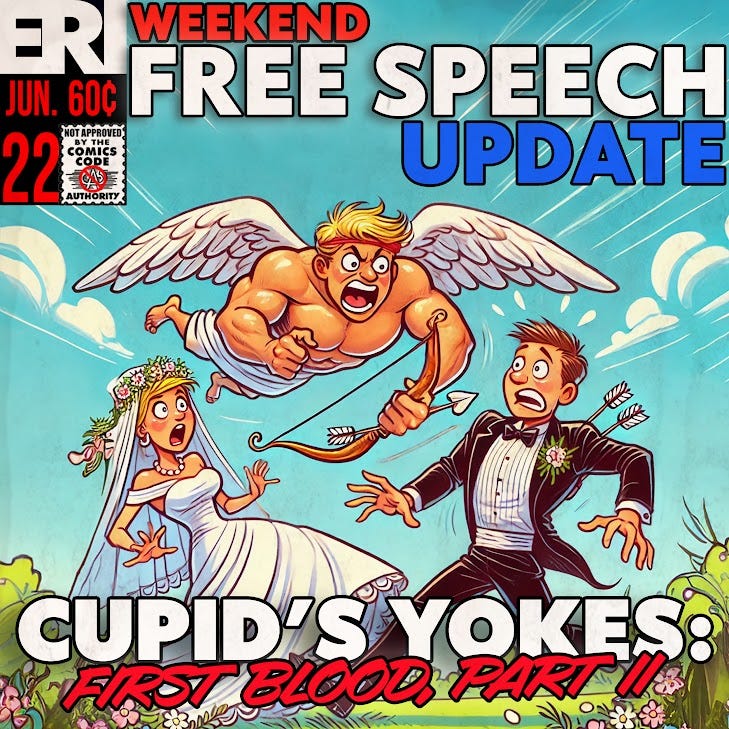FIRE calls on Biden to issue pardon for Comstock conviction & Dean Bobo gives Harvard another boo-boo
Bringing you the latest free speech news (6/22/24)
Stories of the week
While the Stop Comstock Act may never reach Biden’s desk, there’s something he can do this moment to strike a public blow against the zombie law: pardon D.M. Bennett, a freethinking publisher and one of Comstock’s nemeses, who in 1879 was sentenced to 13 months of hard labor for mailing an anti-marriage tract called “Cupid’s Yokes.” Petitioning the Biden administration, Robert Corn-Revere, chief counsel to the Foundation for Individual Rights and Education, wrote, “By granting this pardon, the president would help right the injustice resulting from D.M. Bennett’s wrongful prosecution and conviction, and at the same time send the important message that Victorian-era laws should not be revived to undermine Americans’ individual rights.” From ‘Trump’s Allies Say They’ll Enforce the Comstock Act. Believe Them’ (NYT) by Michelle Goldberg
Don’t Sanction Professors For Speaking Out (Persuasion) by Alex Morey
There are many reasons why sanctioning faculty who speak out against the university is dangerous. Most obviously, it would gut their expressive rights to publicly criticize Harvard’s shortcomings or abuses, amounting to the kind of “professionalism” policy colleges routinely abuse to punish all manner of controversial student and faculty speech. An administrator need only deem speech unprofessional, and they’ve found a convenient loophole around their academic freedom and free speech policies.
An Attack on Free Speech at Harvard (The Atlantic) by Jeffrey Flier
Each of the external constituencies Bobo identified has a legitimate interest in Harvard, and faculty should absolutely have the right to communicate their unhappiness with Harvard and its actions to these groups. Of course, such public criticisms may be right or wrong, well or poorly argued, and faculty risk reputational consequences based on the nature of their criticism. The appropriate response by university leaders who might disagree with such statements is to counter them with speech, as strongly and pointedly as those leaders wish, not to sanction them.
This week in FIRE’s blog
New FIRE poll shows partisanship drives perception of campus encampment protests by Sean Stevens
POLL: Americans oppose campus protesters defacing property, occupying buildings
This week on ‘So to Speak’
FIRE Senior Fellow and former ACLU President Nadine Strossen and George Washington University Law School professor Mary Anne Franks joined So to Speak to talk about the intersection of pornography and censorship.
International free speech stories of the week
Why is Ireland’s hate crime bill attracting so much hate of its own (Al Jazeera) by Barbara McCarthy
‘Canceling’ in the news
London Calling: Ronnie’s First Amendment Rundown
This week, the Supreme Court bolstered the right of government critics, protesters, and other outspoken Americans to sue government officials who arrest them. Texan Sylvia Gonzalez is a grandmother and outspoken critic of the local government. Soon after she won a city council seat, the mayor and his cronies had Sylvia arrested under an “anti-tampering” law for misplacing a petition — something they had never arrested anyone else for, despite people often misplacing government documents. The Supreme Court ruled that speakers like Sylvia can use evidence that officials singled them out for arrest to show a First Amendment violation, even if the officials technically had probable cause. The Court’s decision is a welcome warning to government officials who would abuse their power to silence their critics. (Guest-authored by FIRE Senior Attorney JT Morris)
Video of the month
The Free to Choose Network recently released the director’s cut of their ‘Free To Speak’ docu-series. Enjoy this clip on artistic censorship!






Bono sounds like a bobo, exactly the attitude of a “ no one of is a better judge of who should be censured than I am “ Harvard Dean